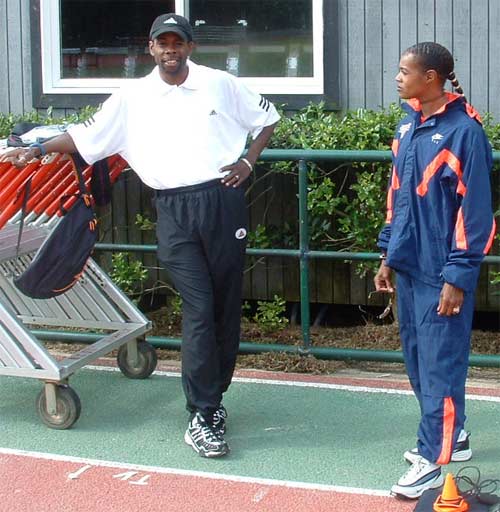Remembering Antonio Pettigrew
By Elliott Denman
At 42, Antonio Pettigrew left us far too early .
He had miles to go and many more years to give of himself, tasks he'd been handling with amazing grace and incredible candor, before he could rest.
Shrouded in mystery at his death, he'd made himself perfectly clear ever since he'd said his goodbyes to the career that had seen him run to Olympic and World Championship glory over the 400-meter route, and began responding to the second calling that saw him coming of age as a world-class coach and inspiration to a generation of young athletes.
"He has done so much for young people through the years," said University of North Carolina coach Dennis Craddock, whose staff he'd joined four years ago.
"Antonio will be truly missed. He was a great person and mentor to young people, on and off the track. He meant a lot to our program. Antonio was a super coach and always told them to "dream your dreams" and then go out and live those dreams.
On learning the tragic news of Pettigrew"s passing, Craddock said "all of us are devastated." And so, in effect, said many others in the track and field world.
"Certainly he'd have liked so many outstanding young runners to come to UNC, and be part of the great Carolina program, where the university itself and he personally had so much to offer," said Darren Boone, a good friend of Pettigrew who now directs the New Jersey-based Shore Athletic Club youth team program.
A top 400-meter man - of course Pettigrew's specialty - on the current UNC team happens to be Charles Cox, a New Jerseyan whose running exploits Boone has been tracking for years.
But for many, of course, that was just impossible, "UNC wasn't for everybody,"said Boone. "So Antonio still helped guide them to other places where he knew they would prosper and blossom out as both athletes and young men and women who'd make their marks in the world in any number of ways"
"He was our friend and a tremendously positive influence on the lives of so very many young athletes," said Joy Kamani of the National Scholastic Sports Foundation.

"Antonio was always smiling, always cheerful, very calm and a friend. He never missed any of our events, including the Great American Cross Country, during the past years when it was in Cary, NC, and then when it moved back to Cary, from Alabama."
Just as he kept proving himself as coach and mentor; Pettigrew had proved himself as a truly superb 400 man.
As a St. Augustine's student, Pettigrew was, incredibly, a 10-time NCAA Division All-American for the powerhouse teams of Coach George Williams. Turning professional, he hit the global circuit with a bang, and nowhere as impressively as the 1991 World Chanpionships in Tokyo.
Roger Black of England and Roberto Hernandez of Cuba were at the top of their game at Tokyo
but neither could hold off Pettigrew, who stormed to victory in 44.57, with Black settling for silver and Hernandez for fourth place, as American Danny Everett squeezed between them.
At the 1998 Goodwill Games on Long Island, it was Team USA comprised of Jerome Young, Pettigrew, Tyree Washington and Michael Johnson storming to a world record 2:54:20 victory.
And yet another pinnacle Pettigrew performance came at the 2000 Sydney Olympic Games, where the team of Alvin Harrison, Pettigrew, Calvin Harrison and Michael Johnson blazed home ahead of the world in 2:56.35.
Ten years later, analysts of the Olympic record book will not, however, find that performance atop the charts. And the circumstances again involved Pettigrew "stepping up" and delivering a courageous performance.
Pettigrew's testimony in the 2008 trial of Coach Trevor Graham on charges of supplying performance-enhancing drugs to the athletes under his charge included the gut-wrenching admission that he, too, had taken performance-enhancing substances, in the period between 1997 and 2001.
Many lesser men would have denied those charges to the rest of their days. Antonio Pettigrew was not ready to be one of them.
He stood up and said what needed to be said. He knew he could not live with himself any other way. Putting it colloquially, he "manned up."
He took his medicine - returning the medals he won in that unfortunate stretch -
and got on with his life. It was a life full of new promise, too.
He leaves his wife, Cassandra and young son, Antonio Jr., along with
legions of admirers. On the track or off it, in the world of sports or the real world beyond athletics arenas Antonio Pettigrew will be remembered as a very special man.
----------
Here is a link to a Facebook page to leave a comment regarding his life if you wish.




